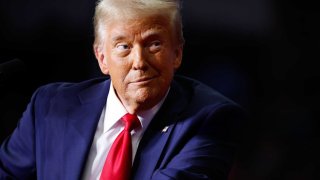Donald Trump Should Lean Into Ally-shoring, Not Tariffs
Rather than wringing their hands over a new Trump presidency, democratic partners around the world should seize the opportunity to forge a shared global agenda to strengthen their own national economies and democracies.
With Donald Trump sweeping to victory in the U.S. presidential election fueled by the economic anxieties and frustrations of working-class voters across ethnic and racial lines, let’s hope he rethinks how to actually deliver economic security to those who aren’t feeling it. New rounds of tariffs will only add to the high cost of living and further pinch the pocketbooks of Trump’s voters (or at least those who aren’t Elon Musk).
Protectionism would also serve to push away countries that are critical democratic allies. In this pivotal international moment, we must enhance and fortify the collective economic and political hand of democracies and lead an expanded and reinvigorated Western alliance in the face of continued aggression and growing collaboration on the part of authoritarians, including China, Russia, Iran, and North Korea.
Hopefully, President-elect Trump will step up to lead the economic bloc of allied countries to stand strong against authoritarian rivals, as the Council on Foreign Relations recently called for. This would be an important and welcome departure from past rhetoric (and behavior) on the part of Trump and his number two, Vice-President-elect JD Vance.
Should the Trump administration not choose this path of action but walk away from the leadership of NATO and the Western alliance, then the other leaders of democracies across the globe are going to need to step up. Leaders of the collective of democratic nations have to find a way not only to prevent Trump from damaging the transatlantic alliance but also to grow, enhance, and strengthen it. This will certainly be tough without strong leadership from the alliance’s ringleader, the United States.
While difficult, there is a path forward to accomplish this trick. It means leaning into ally-shoring, that is, enhancing international economic co-production and sourcing relationships with countries—not just in Europe, but on all continents—who share similar values and want to strengthen the rules-based international trade and economic order.
A program of enhanced investment in economies at home, while ally-shoring abroad, will serve to strengthen the economies of all alliance member states (aiding NATO member nation’s ability to put 2 percent or more of GDP into defense) and, by extension, their political heft. Working together on an ally-shoring economic growth program will put muscle behind the alliance’s security guarantees while bringing new partners into friend-shoring and ally-shoring arrangements.
The wrong course to follow in response to American withdrawal from alliance leadership would be the realignment of democratic nations into a set of various regional power blocs (say, one in Asia, one in the Americas, and one in Europe). French president Emmanuel Macron has made similar proposals under the banner of European strategic autonomy. However, this is a foreign policy cul-de-sac that will leave each regional bloc isolated, smaller, and weaker both economically and politically. China and Russia are rooting for precisely this outcome, which will make dismembering the rules-based international order easier to accomplish.
Instead, now is the time to extend and enhance international engagements, co-production, and sourcing of critical materials and components among freedom-loving and democracy-preserving nations. Only then will the collective gain the economic and political strength and concomitant leverage to do everything from continuing to help Ukraine defend itself to checking China’s designs on Taiwan to countering China and Russia’s political interference in the developing world.
Even in the absence of active U.S. leadership, democracies in Europe, Asia, Africa, and the Americas and like-minded partners can maintain leadership within a highly integrated global economic system. This cannot be done by retreating to their domestic or regional economic fortresses. Rather, democracies must lean into their economic and political entanglements and make the global interdependencies a source of strength. The economies of democratic nations collectively dwarf China and Russia in combined size and market power. These nations working closely together is precisely what Beijing fears most since it negates their ability to offer the rest of the world an economic and political partner on par with the democratic family of nations.
In a globalized economy that China and Russia are eager to segment into competing regional blocs, interdependencies and mutual alliances among countries that share core values can be a force for good.
Rather than wringing their hands over a new Trump presidency, democratic partners around the world should seize the opportunity to forge a shared global agenda to strengthen their own national economies and democracies. Outfitting themselves with the economic strength and political will to maintain democracy and the rule of law at home while countering authoritarian powers abroad, democratic nations can demonstrate that democratic systems deliver more in terms of political freedoms and economic opportunity than authoritarian states.
Having been clearly and democratically elected, let’s hope President Trump chooses the path of leading the alliance of democratic nations in effectively checking China and Russia. Ally-shoring, even without an engaged United States, is the only way to both protect democracy and preserve an international rules-based order.
John Austin is a Senior Fellow at the Eisenhower Institute and a Nonresident Senior Fellow at the Brookings Institution.
Image: Chip Somodevilla / Shutterstock.com.

